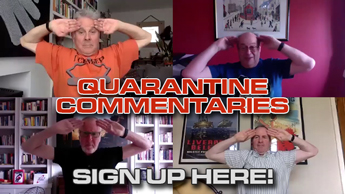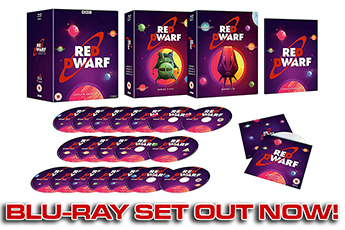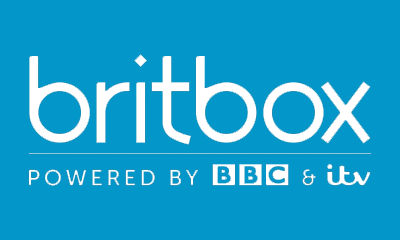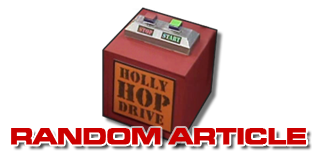 |
Direct Approach It was the season where Rimmer got hard (ahem) and Starbug got blown to smithereens. It was the season that lost Red Dwarf and mislaid Holly. It was also the season that Andy DeEmmony directed - Red Dwarf VI. |

Andrew Ellard
Mr Flibble got his own back on directors everywhere by pointing a video camera at Andy as he asked how he became involved with RED DWARF VI...
I sent a show-reel. I wouldn't class it as a begging letter - well, I don't know... (Laughs) I quite like sci-fi, so I was quite keen. There is a look to 'Dwarf that is quite bold, but [they didn't want] to lose the comedy going for that look. They wanted the combination. Their comedy is very fast, so you can't just roll through it You have to hit all the beats.

Did you start with the location work?
Yes. We did a few weeks location up front, and then [went] into the studio run. We did it in the Tate Modern! Bankside power station - a stunning building, still the best part of the Tate Modern, the building! (Laughs) At that stage it was a derelict power station; a great location. We shot there, [plus] various gravel pits, things to give extra-terrestrial life.
We did shoot in that western town, Laredo - full of nutters. Very, very weird people. They'd spend the weekends there, but completely authentically. No cigarettes, no watches, no nothing. Each of them builds their own house to live in. Living like cowboys - women as well, bizarrely. And the kids must have a ball... (Laughs) I'm a big western fan, you see. I was so chuffed when they wrote that.
What about the GELF village used in Emohawk - Polymorph II?
I seem to remember picking that up in the middle, because they hadn't written it by the time we started. Tom Beringer had just done a medieval thing at Shepperton, and Rob and Doug - as they were wont to do - were wandering around trying to find a location for the next episode, saw this village, and so wrote the GELF village episode. We got a very plush village location for nothing!
Mr Flibble asked Andrew to ask Andy... then he got too confused and forgot the question. Andrew asked how tricky the EDITING process was.
The edit was very, very hard. In hindsight, Rob and Doug were right. They like to shoot over and then edit it down. We were shooting maybe ten minutes over on most of the episodes. I've got it in my mind that we edited for three months - I think we did. I remember being sat in The Edit Works and just spooling tapes, spooling tapes...
We were taking out unnecessary lines, any pauses, and it just gets tighter and tighter until, if they blink, you'll have it out. If they pause for a moment of breath we'll whack it out. It was very hard to get those down. I think there's still a few painful edits in there - Rob and Doug would rather have a dodgy edit but get the funniest moments in there.
They like the flaws in their science-fiction as well. In the warm-up they'd always run questions with the audience - who did this, when did Lister have his appendix out? - and people would have answers above and beyond Rob and Doug. They'd have worked out a whole back-story. So they didn't mind pissing them off here or there, throwing a spanner in the logic.

Tell me about the LAST MOMENTS of the series, with Starbug's destruction...
We shot further than was shown, and we were all very unsure where to leave it. You could always kill them and bring them back. You could leave them on the edge of dying, you had free reign to do anything. I think complete death was a bit of a downer, so we left it on the edge.
You left in Rimmer's last, heroic charge...
There were quite a few debates about that at the time, because it's quite out of character. But maybe that's quite nice. It reached such a point that even he was out of character. Sometimes those breaks in character logic, or the flaw in your plot, is the interesting element.
What did you make of the writers? Because it was a series filled with some fantastic new ideas...
It's where they are so strong - great concepts. Big and bold. What I always appreciated in the show was that it was very clever. Characters could be stupid, situations ridiculous, but the script was clever.
As I always saw it, from the interaction I had with them, Doug was plot and stories and character moments, Rob would have the bizarre, left-field lines. I think they played with that, because Rob was keener on the sci-fi. I might be completely wrong, but the way I always read it, Rob had the bizarreness, Doug had characters and plotting. I don't think they separated it in any way, but there was a line we had a problem with, Rob would come in with 'yellow streak like a heard of diarrhoretic camels'. I remember him coming up with that off the top of his head when we didn't like the line we had. Whereas Doug was more analytical - getting it right and precise.
Moving on, you directed the first series of THE MARK THOMAS COMEDY PRODUCT, where the budget for the last episode was gambled away...
We bet the budget of what it would have cost to shoot in the pub, about �12,000, on a horse. We got a tip-off from a jockey we knew who said, 'This is the horse to go for'. Sixteen to one. I think we put ten thousand in cash, so it would have [won] £160,000. The really annoying thing was that Mark liked the name of another jockey, Colin Nutter... and he came in last. [What would have been] our horse won, at 16-1, but we didn't have any money on it.
So we shot in my house! We had about thirty, forty people in my lounge, and anyone who was on the staff had to do a camera; so I did one, the editor did one, the DoP [Director of Photography] did one, and my wife did one.
Had the horse won, where would you have filmed?
I think the Brixton Academy was the venue. I think we were going to put a couple of thousand behind the bar in 32 pubs in 32 cities. It was all worked out. Helicopters coming in at the beginning of the show... We were going to spend it all in one day! (Laughs)
You chose not to stay with the show, didn't you?
I didn't do the second series. I got 7 ITC rulings against me, threatened with several D notices from the Ministry of Defence, just got lots and lots of hassle. It was very untrodden ground then, so Channel 4 had no idea what we should or shouldn't do. It's a great medium, and I love the shows, but it's not a director's medium, really. You're catching the event, what you need is just coverage. Even more so now.
Bizarrely, the original Mark Thomas Comedy Product has split into two shows now - The Mark Thomas Product and Trigger Happy TV. [Trigger Happy's] Dom [Joly] was in Mark Thomas. We had two researchers, Posh Dom and Common Dom, and when Mark wasn't there, they'd go in and do it. But they were much more into doing silly stuff. We did a thing [about] kicking footballs into people's gardens - Buckingham Palace, Downing Street - and the two of them playing schoolboys. So we then did a pilot called Dog Bites with the two Doms. Then Common Dom went on to produce The 11 o'Clock Show, [while] Posh Dom did Trigger Happy TV.

My Flibble whispered 'cut' and put down his camera, changing to subject to some of Andy's OTHER COMEDY SHOWS - starting with Sunnyside Farm...
Sunnyside Farm was a very weird little series. It was a bit too dark for the BBC - they said, 'These people are horrible'. That was the idea, really. It's such a pity, because it had a strong little following. I really liked it. I've done shows I didn't like, but we had such a ball. Mark Addy and Phil Daniels were just brilliant. It was too dark, I think; people got a bit scared.
You then directed the first series of The Creatives...
Jack [Docherty] and Morray [Hunter]- the Spitting Image connection again with Absolutely. John and Murray are really good writers. We had a really good time doing it. It's a little bit insular - things that deal with the industry are always hard, because we get it [but] you don't know what the outside people get. It was a tricky one, really.
As with many others, you also only did the first season of At Home With The Braithwaites about a family who win the lottery. Were you pleased with the casting on that?
Superb cast. They key to all of these things is getting good scripts and getting good people to deliver them. Peter Davidson was the big revelation, really. We weren't sure, and then he did an episode of Hope and Glory where he played an exiting headmaster, and he was just fantastic. We talked to him the next day - he is a comedy genius, but you have to bring him down in a drama. His temptation is to always look for funny gags: 'I'll fall over here, I'll slip on that... '
Amanda Redman is just stunning; [and] a bit scary. She's so professional and exacting. There was one ten-minute scene between her and Peter Davidson, a sort of final confrontation, and they both wanted to do it in one go. We did it [with] a shot on each, and in the middle was a scripted moment where a little tear comes to her eye - she doesn't want to show it, hides it, then carries on shouting. And she hit this tear so fantastically, but then I said, 'I have to go in for a close up on that moment. Do you want to run the whole thing?' She said, 'No, no, no'. She went from a line before, dry-eyed, and on exactly the same cue, bang. Every blink, every flutter, was identical on every take of every speech she did.
But you didn't do the second series...
No, I got offered Score in Wales, so I did that. I'm not a big football fan - it's about a football team who win the lottery. I've got this Lottery niche now, you see. (Laughs) They've all signed a contract for their syndicate that they'll use the money to turn themselves into a professional team. But, obviously, all their wives want the money!
And that goes out in May?
We don't know if it'll go out as one two-hour film or two one-hours. The first part is quite light, and the second part is very dark.
Mr Flibble enjoyed talking to Andy DeEmmony, and now that it's over... Mr Flibble is very cross.














